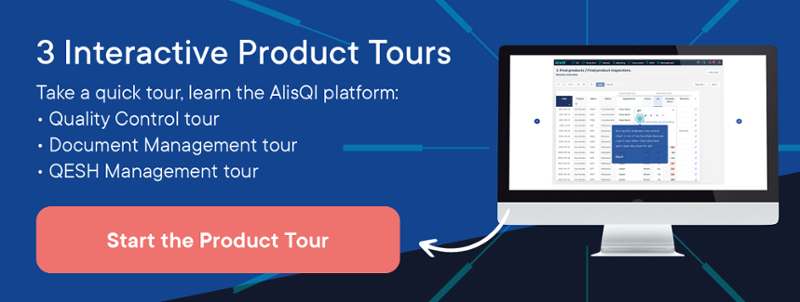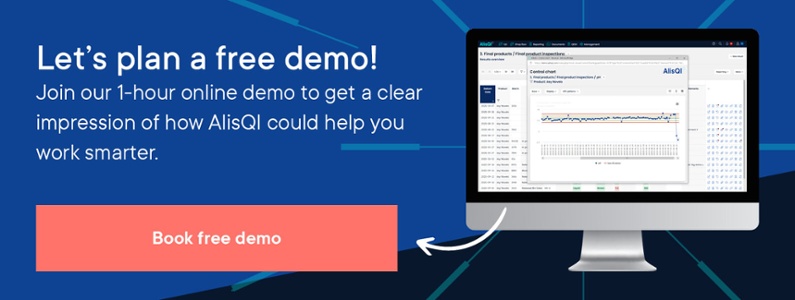Solvers help you monitor quality, apply SPC, manage equipment, and ensure traceability.

What’s an iPaaS and how does it work with AlisQI?
In a previous blog, we looked at the importance of integrations and how these improve a factory’s infrastructure. We briefly discussed the advantages of modern integration tech and gave a few reasons why your QMS is the ideal hub for the factory of the future.
Today’s article highlights one integration strategy that is increasingly more common: the adoption of an integration Platform as a Service (iPaaS). How can manufacturers standardize integrations with iPaaS? How does iPaaS work with AlisQI? And what resources are needed for this integration? Let’s find out.
iPaaS: your quick introduction
With a large variety of business applications available today and new apps invented faster than most factories can deploy them, it’s not always easy to automate business processes, share the growing volume of data, and maintain visibility across the departments. This is where iPaaS comes in – a cloud-based platform that standardizes the monitoring, maintenance, and process updating across applications.
Using iPaaS, manufacturers can centralize integrations and leverage the advantages of automation. This while it significantly reduces the resources needed. Building integrations with iPaaS is not only quick and easy but it can also be done by the quality team or other citizen developers.
How to standardize integrations with iPaaS
Despite the advantages that they could leverage from integrations, most manufacturers are not focused on these. More specifically, they build integrations after adding new applications or on an as-needed basis. There are three major types of integrations: vendor-built or native integrations, third-party point-to-point (P2P) connectors, and build-it-yourself (DIY) integrations. Each of these comes with its pros and cons.
So where does iPaaS come in? Using iPaaS, manufacturers enjoy the benefits brought by all the above-mentioned types. Here you can think about easy setup, user-friendliness, and low dependencies on technical resources. You can enjoy integration functionality out-of-the-box, and developing this is neither cumbersome nor expensive.
AlisQI in the smart Industry 4.0 ecosystem
As mentioned above, the technology app landscape has been booming in recent years. AlisQI has been recognized for its contribution to smart manufacturing. The Future of Manufacturing listed our app in Industry 4.0 – Reinventing the Factory Stack landscape in the Analytics/Efficiency category. We’re proud to be here and are actively increasing our footprint in the smart factory ecosystem.

This also means that AlisQI needs to be integrated with a large variety of systems, sensors, and instruments. AlisQI can easily be integrated into the bigger ecosystem of a manufacturing plant. We leverage modern technology to consume data from external sources, as well as provide access to all data in AlisQI for external tools. This includes both raw data as well as aggregated data.
How does iPaaS work with AlisQI
There are numerous iPaaS solutions available these days. AlisQI can work with all of them. Some examples include Wokato, Zapier, Mulesoft, Make.com, Blendr.io, Jitterbit, and Dell Boomi.
As our API exposes all master data and transactional data, as well as our Statistical Process Control engine, you can go nuts building your own integrations. In some iPaaS environments, we deployed a native AlisQI connector, allowing for one-click deployment of integrations.
iPaaS examples we have been working on lately include:
- Sensor or Laboratory Instrument integration. Acquire and transform data from lab instruments or in-line sensors.
- ERP/MES/LIMS integration. Acquire master data and/or production order data from cloud or on-premise business information systems.
- Microservice integration. Leverage the power of SaaS microservices, like advanced document parsing or AI.
- E-mail attachment import. Listen for incoming e-mails with attachments and upload them to your AlisQI quality records.
- Notification service providers. Transform AlisQI events into notifications that can be sent to front-line workers by e-mail, text messages, or WhatsApp.

iPaaS integration: what resources are needed?
Integration used to be cumbersome and expensive using traditional technology. More specifically, developing an integration might have been a solid IT project, requiring resources from internal and external IT specialists. With an iPaaS platform, integrations can be created by citizen developers. This means that you do not need to be a computer science graduate to create solid and production-ready integrations. iPaaS tools with predefined connectors let quality managers or quality engineers create integrations in an hour or two. Admittedly, you might need to be a bit tech-savvy. But provided you like fiddling around with software, you should be able to do this. And with all the Excel magic we see around quality teams, tech savviness is not the issue.
Conclusion
Manufacturers can standardize integrations with the adoption of an iPaaS. This increasingly more common integration strategy helps quality teams leverage the advances of automation while significantly reducing the resources needed. At AlisQI, integrations are a cornerstone for quality management. Our smart no-code platform can work with all the iPaaS solutions available out there. Your QMS is the ideal hub for the factory of the future, connecting a large variety of systems and making quality management smart and omnipresent.
Click on the banner below to request a customized demo and find out more.



